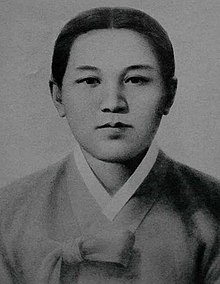Kang Pan Sok
This article needs additional citations for verification. (December 2012) |
Kang Pan Sok | |
|---|---|
 | |
| Born | 21 April 1892 |
| Died | 31 July 1932 (aged 40) |
| Birth name | |
| Chosŏn'gŭl | 강반석 |
|---|---|
| Hancha | |
| Revised Romanization | Gang Pan-seok |
| McCune–Reischauer | Kang Pan-sŏk |
Kang Pan-sŏk (21 April 1892 – 31 July 1932) was the mother of North Korean leader Kim Il-sung,[1] grandmother of the late leader of North Korea, Kim Jong-il, and great-grandmother of the current leader of North Korea, Kim Jong-un. She was a Korean independence activist and communist politician. April 21 is a day of memorial for her in North Korea, when a wreath-laying ceremony is held at Chilgol Revolutionary Site, in what was Chilgol-ri, a town once in Pyongan Province and today part of Pyongyang.
In North Korea, Kang Pan-sŏk is referred to as the "Mother of Korea" or "Great Mother of Korea". Both titles are shared with Kim Jong-il's mother Kim Jong-suk.[2] [3][4] However, it was Kang Pan-sŏk who was the first family member of Kim Il-sung to have a cult of personality of her own to supplement that of his son, from the late 1960s onwards. In 1967 Rodong Sinmun praised her as the "mother of all". The same year, the Democratic Women's League initiated a campaign called "Learning from Madame Kang Pan-sŏk". There is a song by the name of "Mother of Korea" in her honor,[5] as well as a hagiographic biography, also called The Mother of Korea (1968).[6]
The Protestant Chilgol Church in Pyongyang is dedicated to the memory of Kang Pan-sok, who was a Presbyterian along with her husband Kim Hyong-jik. Her name meant "rock", having been named for Saint Peter. The church may or may not be a show church, to create the appearance of freedom of religion in the DPRK.[7]
| ||||||||||||||||||||||||||||||||||||||||||||||||||||||||||||||||||||||||||||||||||||||||||||||||||||||||||||||||||||||||||||||||||||||||||||||||||||||||||||||||||||||||||||||||||||||||||||||||||||||||||||||||||||||||||||||||||||||||||||||||||||||||||||||||||||||||||||||||||||||||||||||||||||||||||||||||||||||||||||||||||||||||||||||||||||||||||||||||||||||||||||||||||||||||||||||||||||||||||||||||||||||||||||||||||||||||||||||||||||||||||||||||||||||||||||||||||||||||||||||||||||||||||||||||||||||||||||||||||||||||||||||||||||||||||||||||||||||||||||||||||||||||||||||||||||||||||||||||||||||||||||||||||||||||||||||||||||||||||||||||||||||||||||||||||||||||||||||||||||||||||||||||||||||||||||||||||||||||||||||||||||||||||||||||||||||||||||||||||||||||||||||||||||||||||||||||||||||||||||||||||||||||||||||||||||||||||||||||||||||||||||||||||||||||||||||||||||||||||||||||||||||
Notes:
| ||||||||||||||||||||||||||||||||||||||||||||||||||||||||||||||||||||||||||||||||||||||||||||||||||||||||||||||||||||||||||||||||||||||||||||||||||||||||||||||||||||||||||||||||||||||||||||||||||||||||||||||||||||||||||||||||||||||||||||||||||||||||||||||||||||||||||||||||||||||||||||||||||||||||||||||||||||||||||||||||||||||||||||||||||||||||||||||||||||||||||||||||||||||||||||||||||||||||||||||||||||||||||||||||||||||||||||||||||||||||||||||||||||||||||||||||||||||||||||||||||||||||||||||||||||||||||||||||||||||||||||||||||||||||||||||||||||||||||||||||||||||||||||||||||||||||||||||||||||||||||||||||||||||||||||||||||||||||||||||||||||||||||||||||||||||||||||||||||||||||||||||||||||||||||||||||||||||||||||||||||||||||||||||||||||||||||||||||||||||||||||||||||||||||||||||||||||||||||||||||||||||||||||||||||||||||||||||||||||||||||||||||||||||||||||||||||||||||||||||||||||||
References
- ^ "NORTH KOREA THIS WEEK NO. 468 (October 4, 2007)". Yonhap News Agency. October 4, 2007. Retrieved 19 December 2011.
- ^ Armstrong, Charles K. (December 2005). "Familism, Socialism and Political Religion in North Korea". Totalitarian Movements and Political Religions. 6 (3): 390. doi:10.1080/14690760500317743.
- ^ David-West, Alzo (2011). "Archetypal Themes in North Korean Literature". Jung Journal: Culture & Psyche. 5 (1): 73. doi:10.1525/jung.2011.5.1.65.
- ^ Ken E. Gause (31 August 2011). North Korea Under Kim Chong-il: Power, Politics, and Prospects for Change. ABC-CLIO. p. 63. ISBN 978-0-313-38175-1.
- ^ Jae-Cheon Lim (24 March 2015). Leader Symbols and Personality Cult in North Korea: The Leader State. Routledge. pp. 24–25. ISBN 978-1-317-56741-7.
- ^ Kim, Suk-Yong (2011). "Dressed to Kill: Women's Fashion and Body Politics in North Korean Visual Media (1960s – 1970s)". Positions. 19 (1): 173. doi:10.1215/10679847-2010-028.
- ^ Evans, Stephen (3 August 2015). "North Korea and Christianity - uneasy bedfellows". BBC. London. Retrieved 3 August 2015.
Further reading
- The Mother of Korea. Pyongyang: Foreign Languages Publishing House. 1978. OCLC 6695920.
- Mrs. Kang Ban Sok, mother of the great leader of Korea. Pyongyang: Central Committee of the Korean Democratic Women's Union. 1968. OCLC 11370735.
